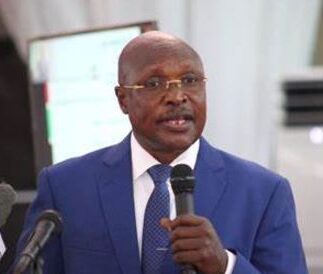The Eastern Equatoria State Legislative Assembly reopened on Monday for its second session after four months on recess, with calls for the House’s leadership to screen absentee staff and lawmakers who have since absconded.
The Assembly was closed on 5 February and was expected to reopen in May, but it was delayed due to budgetary constraints.
Speaking at the opening of parliament, Governor Louis Lobong Lojore stated that several parliamentary staff members and legislators have not been working but are still receiving pay, an act he described as corruption.
“There is a need to screen the workforce in this Legislative Assembly. I have been told this August House has more than 100 workers, and if it is true, then there is a need to screen [staff] because I do not think we need such a huge workforce for this House,” he said. “Most of them are not even turning up for the job, and this little money can help the Assembly to do something instead of paying ghost names.”
“Also, there are some MPs who have spent more than a year without attending sessions, and yet they get their salaries; this is very unfair, it is corruption,” Governor Lobong added.
He also urged the executive to immediately present their policies and programs to August House for deliberation and encouraged citizens to contribute to cost-sharing for easy service delivery.
“I am directing the State Ministry of Finance, Planning, and Investment to present an expenditure report and the new budget 2025-2026 for deliberation,” Lobong stated. “I call upon the parliamentarians to assist in legislating policies and programs that can encourage our people to contribute to the cost-sharing of the very vital services to them.”
For his part, House Speaker Charles Udwar Ukech lauded the lawmakers for their endeavors in ensuring services are delivered to the state’s citizens.
“Your collective efforts are the cornerstone of this Assembly’s strength and effectiveness. Honorable members, as we open this session, I must again emphasize that no absenteeism will be tolerated without written permission this time,” he said. “Parliamentary rules must be observed without compromise. Let this session be a one of discipline, accountability, and full engagement.”
Peter Lokong Aitiy, the Clerk to the House, said the reopening of the Assembly was delayed due to circumstances beyond the government.
Meanwhile, Ayero Betty, a resident of Torit’s Hai Gwanya suburb, appealed to the government to address skyrocketing commodity prices.
“Civilians are suffering due to the economic crisis, and some parents cannot afford to send their children to school,” she lamented. “If you go to the market, you cannot afford food and other essential commodities for the family.”
For Vitale Abure, a local civil society activist, providing civic space and security is key for the success of the elections in December 2026.
“We need practical action from our legislators and not politics of words in rendering services that benefit citizens so that we lift Eastern Equatoria and the country to the next level,” he said. “Security in our state and the country is a priority as the election approaches, and the government should open up civic space.”




